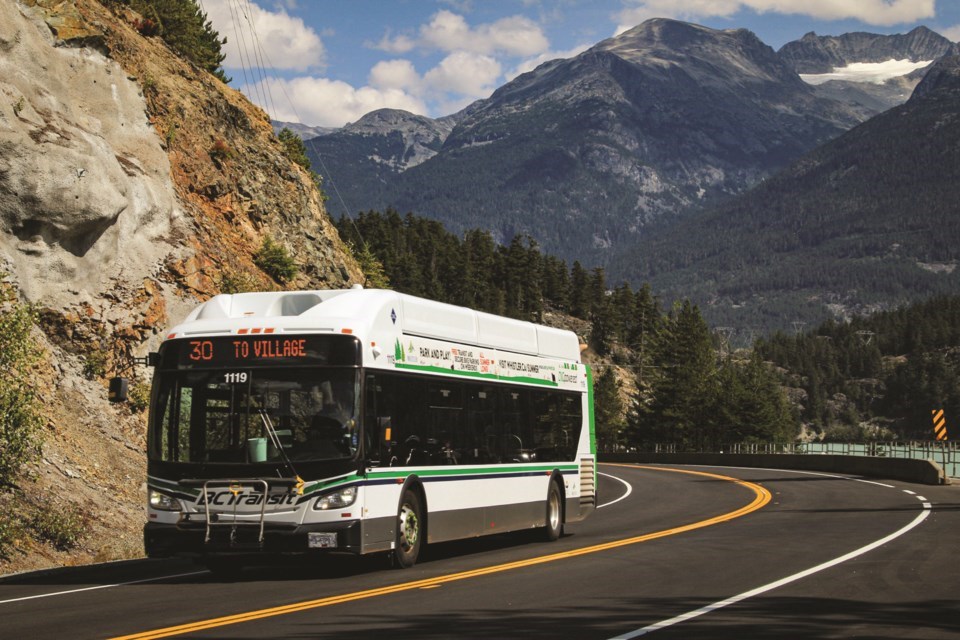The Squamish-Lillooet Regional District (SLRD) is allocating $1,525,000 given to it as a one-time grant from the province.
The money will be split between five projects: Four recommended by staff, and one inserted by board members at the Nov. 22 board meeting—regional transit.
The district received the money as part of the province’s Growing Communities Fund, a billion-dollar cash-splash for all local governments across the province to “support the delivery of infrastructure projects necessary to enable community growth,” according to a government release.
Of the grant funding, $300,000 will be used to develop a corporate asset management plan for the regional district; $100,000 will be spent gearing staff up with the resources they need in asset management software; $150,000 will improve radio coverage in the Howe Sound East area; and $250,000 will go towards improvements at the Lillooet landfill—leaving $725,000 to go towards the SLRD’s efforts to develop regional transit.
But that allocation came after the board originally sent staff back to provide more information on the funds and their initial list of projects identified back in October, more than an hour of discussions at the November meeting, and a rejection of the staff report in a split vote.
The $725,000 pushed into the column for regional transit was earmarked by staff for three other high-priority projects under the rationale they were critical community services under financial strain with no capital funding: $400,000 for the Bralorne sewer service, which staff noted was incomplete and lacked system tie-ins despite works between 2016 and 2021; $175,000 for Gold Bridge transfer station service improvements off the back of a risk assessment that identified critical capacity shortages in the facility; and $150,000 for wastewater treatment plant repairs at Furry Creek and Britannia Beach.
In the staff report board members were discussing on Nov. 22, regional transit was listed as a project that was considered, but not included “due to staff capacity constraints ... therefore infrastructure projects could not be developed.”
In discussing the projects recommended, board members debated the spirit of the intention of the funds.
Area C Director Russell Mack and Pemberton Mayor Mike Richman, in particular, expressed disappointment with the staff report that there were no projects specific to Area C (north of Whistler, surrounding Pemberton)—an issue they both brought up at the October board meeting when the board voted to send it back to staff for more information.
“I thought it was supposed to be allocated for the whole region and not just for specific projects that staff decided to pick out,” said Mack at the meeting, adding he would have liked the board to have had more input in identifying high-priority projects.
Richman talked along the same lines, and noted that given the funds were for “growing communities,” and Area C has seen a lot of growth in recent years, he would have expected the area to get a bigger slice of the pie if the funds were distributed regionally.
During discussion, board members expressing opposition to the staff recommendations coalesced around a common theme in preferring more regionally-oriented projects, with regional transit coming out of the end of drawn-out discussion as a preferred option despite staff explaining there were no regional transit projects on the go to capture the funds. Staff, however, added the funds do not have to link to shovel-ready projects, but need to be allocated to projects that can be completed within the province’s timeframe of five years.
While board members voted down the original list of seven projects 7-4, a larger majority of 9-2 supported picking out the four more regional projects with the addition of regional transit soaking up the funds that the three more targeted projects missed out on.
Whistler Mayor Jack Crompton said he believed the funding allocation was “well considered” by the board.
“I understand the disappointment and I think it’s important to note that the things that haven’t been included here will remain high priorities for our team as we go and look for money through other processes,” he said.
He added he believes allocating the $725,000 towards the SLRD’s long-term goal of developing regional transit takes the money “in the right direction as far as what the funds are intended to do.”
The funding was required to be allocated by Dec. 31, and is intended for projects that can be completed within five years from the province’s allocation, putting the final deadline to spend the money at March 23, 2028—essentially meaning the SLRD expects to have spent the $725,000 on developing regional transit by then.
The allocation will be reviewed by the province for approval, and the SLRD will be required to provide an annual report on how it is being spent.
The money for regional transit will flow into the SLRD’s Regional Transit Planning and Infrastructure service, which is intended to plan and deliver improvements to public transit in the SLRD. Prior to the allocation of the $725,000, the service had a $71,190.46 operational reserve, and a $3,934 capital reserve—meaning the new funds increase the money available for developing regional transit by 10 times (should it be approved by the province).
The Growing Communities Fund was divided between every local government in the province. Of the municipalities within the SLRD, Squamish got the most cold hard cash at $6,285,000, while Whistler received $4,962,000, Pemberton received a little over $2 million and Lillooet pocketed $1,282,000.




